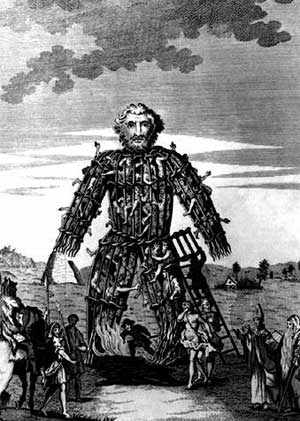As I mentioned in an earlier post, among a host of other projects this summer, I'm attempting to expand the depth of my Olde School Wizardry campaign by running a series of one-shots within the same campaign world, but using different published rules sets. Each set of role-playing rules has its own unique flavor and tends to encourage both a certain style of play and the emergence of specific themes.
Robin Laws explains:
"Another factor to consider when choosing a game is how well its theme and tone suit your tastes, and those of your group. We often focus on how well a game's rules perform certain tasks: we want to know if its combat system is elegant or clunky, its character progression fast or slow, its powers well-tested or unbalanced. At least as important is its emotional content."
(from Robin's Laws of Good Game Mastering, 2002, available here)
| . |
I chose to use TSR's Marvel Super Heroes Advanced Set for my first one-shot ... though, since at the time of this writing I'm planning a third session, I probably need to come up with something better to call them ... "mini-campaigns" ... "spinoffs"?
 |
| This was before Spawn, Deadpool, and any of the grittier stuff. |
A couple years ago, when my friend Steve hooked me up with a whole box of HeroClix, I dug my box back out and taught my kids to play, running a half dozen short adventures for Red Wasp, Super-Sarah, and Ironman. We had fun with it, but with school limiting game time we focused much more on D&D.
This year I dusted MSH off yet again and converted the Universal Table to D20 (basically just divide everything by 5) to use as the core mechanic of a Buffy the Vampire Slayer / Call of Cthulhu mashup set in Arkham Massachusetts. I can't claim credit for the idea -- it was Steve's -- but four young ladies in my middle school after-school games club seemed to enjoy unraveling the sinister plots of Keziah Mason (though they actually got pretty attached to Brown Jenkin, deciding that he was too cute to slay).
 |
| If you haven't seen it yet, please do yourself a favor and watch this |
Penned by Jeff Grubb, who clearly knew and loved his source material, Marvel Super Heroes Advanced Set did a far better job than most games of emulating the big, two-fisted, four-color world of action found in the marvel comics titles of the 80s.
MSH gets right to the point -- The very first ability score you generate for your character is "Fighting". That's right, in MSH punching people in the face isn't a skill that some characters have in varying degrees, it's an ability score ... its fundamental to who every character is and becomes their first and most basic measure of identity, because, you know ... super heroes!
 |
| Best . Punch . Ever |
Here's what else MSH offers:
- Character generation provides a sweet balance of random rolls and player choice.
- Power Stunts (using your powers in less than straight-forward ways), The Universal Table mechanic, and broadly defined categories of action mean you can quickly and easily simulate any sort of action that you can find on the page of your favorite comic with virtually no crunch.
- A round is the amount of time it takes to do something in the frame of a comic book page.
- The experience system is innovative -- players acquire points (karma) for doing heroic things in proportions that throw system weight behind the theme of the game -- saving citizens and preventing crime will net you more karma than merely pounding on Dr. Octopus. Karma is acquired at the end of each encounter, keeping the choice-to-reward interval very tight. More importantly, karama can be spent to modify just about any die roll. This creates a constant tension for players between choosing to stack the deck for short term success versus saving karma for long term improvement (a very gradual process).
- Contacts are flexible and represent allies that the characters can call upon in need. What's cool about this system is that the players don't need to identify their contacts during character generation but may opt to save them to declare at any future point in the game. In addition to shifting some narrative control to the players, this also simulates the turn-on-a-dime plotting of many comics. Black Widow just happens to have worked with a fellow who can get the heroes the schematics that they need to sneak into the facility and catch the bad guy off guard before the hostages can be harmed.
- The Resource System is light and flexible, throwing the game's focus back on the heroic action scenes where it belongs. You don't know exactly how many millions Tony Stark is worth, you just have a general idea of what he can buy at short notice and what he can't.
If you can't spring for the $100 to get your own vintage copy, you can get free pdfs of the rules and just about everything else ever published for the game at Classic Marvel Forever -- a truly amazing and obsessive work that also includes stats for every hero and villain you can think of, adventure seeds, and D20 conversions.
 |
| . |
So how did MSH work for a pseudo-Homeric Classical Age mini-scenario?
Pretty doggone well!
Our story opened with a small group of "Champions" deciding to go rogue and escape the grip of the Auld (pronounced "old"), an evil, alien, psychic overlord.
In session one the players built characters, learned the basics of the system, hatched a very basic plan, and effected their escape. They weren't going to get off easy of course, and in the second session we shifted into hunt-down-the-runaway-supers mode, a style used so well in Uncanny X-Men titles of the 1980s. The climax of the second session was a three-on-three super hero fight.
On the players' side were:
- The Speculator ("The spy"), who bent light around him so that he walked cloaked in shadows and could blind foes with a touch. His piercing gaze could penetrate any illusion and detect the slightest details in his environment.
- It Sweeps, formerly a janitor in the palace of the mad overlord, he could unleash swirling clouds of sand, grit, and glaring light capable of blinding and disorienting foes. He could further shift these forces to created detailed mirages.
- Krome, his bones replaced by a captive water elemental, lashed out with amazing strength using the pair of aqueous tentacles sprouting from his back and was able to pound all but the toughest foes into oblivion in seconds.
On the NPC side and blocking the escape of the characters were:
- Primus Gvarrus, a hulking suit of burnished bronze armor, piloted by the suffering mortal trapped within.
- Krathel, who attracted and adhered dead vegetation until he became a sort of thirty-foot-tall living wicker man.
- Aquilla, an airborne blaster who scouted out the action and attacked from above.
 |
| . |
Intimidated by Gvarrus's nigh-invulnerable might, Sweeps opted instead to neutralize Aquilla with a series of blinding blasts that kept him out of the action. Meanwhile, Gvarrus and Krathel teamed up to pound Krome senseless, foiling his escape. Picking his moment carefully, The Speculator blinded Gvarrus and, depleting his karmic reserves, forced his way through the psychic barrier to freedom with Sweeps on his heels.
The final act of session two was an amusing denouement-turned-chase-scene involving a lake, a hedge, and a sheep, in which Sweeps accidentally divested himself of his super powers, ensuring that he would escape the inevitable pursuit by the agents of the Auld.
I'm keen to see what our third and final session of this MSH mini-campaign will bring. I think we'll roll the clock ahead and pick up with The Speculator and his comrades having settled in to watch over a sea-side, bronze age community as its benevolent guardians. How will the village fare when the servants of their former master finally track them down?

No comments:
Post a Comment